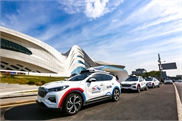
Visitors experience the autonomous driving system of Baidu Apollo at the Shanghai Auto Show, April 19, 2021. Photo: VCG
Chinese Internet giant Baidu said it has become the world's largest autonomous driving service provider, after years' exploration on autonomous driving technology, and it aims to expand the services to more cities.
Apollo Go, Baidu's autonomous ride-hailing platform, has provided 115,000 rides in the third quarter, making Baidu the world's largest autonomous mobility service provider, Baidu CEO Robin Li said in an internal letter to company staff members on Wednesday after the company reported its quarterly financial result.
Apollo Go now operates in Beijing, Guangzhou, South China's Guangdong Province, Changsha, Central China's Hunan Province, Cangzhou, North China's Hebei Province, and Shanghai where passengers can hail a robotaxi using the mobile platform. Baidu aims to expand its Apollo Go service to 65 cities by 2025 and 100 cities by 2030, Li added.
Apollo L4 has accumulated over 10 million test miles, up 189 percent year over year, and has received 411 autonomous driving permits, reflecting Apollo's broad geographic coverage and wide-ranging test scenarios, according to the earnings. Rides provided by Apollo Go doubled sequentially. As of September 2021, the Apollo platform has over 210 partners, 65,000 global developers, and 700,000 lines of open-source code.
Baidu on Wednesday reported its financial results of the third quarter, showing that its total revenue ended September 30 reaching 31.9 billion yuan ($4.95 billion). Non-GAAP net income attributable was 5.1 billion yuan, which beats market consensus.
Baidu attributed the soaring self-driving to the long-term investment on reform and development (R&D). In the third quarter of this year, its R&D expenses reached 6.2 billion yuan, a year-on-year increase of 35 percent.
"Baidu is bringing innovation across the consumer, enterprise and public sector with our commitment to AI," Li said, adding that their AI Cloud is helping businesses better serve customers and move faster with greater efficiency.
With a diversified AI portfolio, including cloud services, smart transportation, smart devices, self-driving, smart EV and robotaxi, we are well positioned for long-term growth, Rong Luo, CFO of Baidu said.
According to a recent IHS Markit report, the major market potential for autonomous vehicles in the future will be pinned on business models such as robotaxis, which are estimated to account for more than 60 percent of China's future mobility sharing market by 2030, exceeding $201 billion.
Market watchers said that the future travel ecology centered on autonomous driving is very likely to generate a massively big market. China may become the world's largest autonomous driving market and a strong player on the track in the future.

